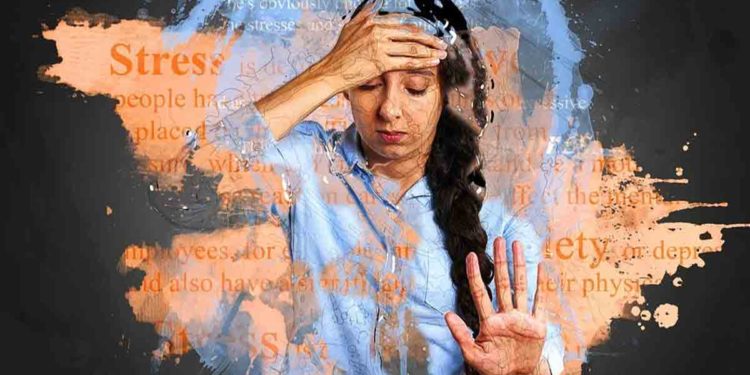The coronavirus pandemic has brought in a big change in our lives and habits in recent months. Given the increase in stress and worry in many, the need to manage one’s mental health optimally in these times has been increasingly recognised by health agencies across the world. I have, in my clinical practice, come across troublesome pandemic related anxiety, both in the general public and in people with pre-existing mental health problems.
Before coming to what can be done to overcome stress and anxiety related to the pandemic, lets us understand firstly why and how we react to any situation of potential danger.
Stress response in humans
The primitive parts of our brain are wired to react to danger or an acute stress event by a “flight or fight” mechanism. Several neurochemical changes occur in the brain in response, in particular, the activation of the sympathetic nervous system and the release of a hormone called adrenaline. This gets us to an alert or vigilant state that essentially helps in fighting the danger or escaping it. During such state, our mind is scanning all around for dangers, there is a rush of blood in our system, and we experience several other symptoms of anxiety (e.g. sweating, palpitations, increased breathing, etc).
Why do we overreact?
Though an overactive sympathetic nervous system within our brains and body helps in dealing with an acute stress event, sometimes we err on the estimation of the threat severity, and generate excessive responses to a perceived danger that really isn’t big, or continue a stress response even as the danger is no more acute. The reason why some people err in interpreting the threat while others do not, is rather complex, and in part is related to genetic make-up of a person, and childhood and past experiences.
What helps in overcoming stress?
Fortunately, one does not always need to address the underlying causes that makes a person prone to anxiety. One can start with methods that simply aim at addressing the current anxiety symptoms (let it be physical symptoms such as palpitations, restlessness and sleeplessness; or mental symptoms such as difficulty concentration, worry and ruminative thinking), alongside dealing with the threat / danger if there is one, in a practical manner.
What can help in minding my mental health during the coronavirus pandemic?
Below are simple and practical tips that help in managing stress during the coronavirus pandemic
- Do not watch the news frequently: in fact, if you realise that it is becoming an urge or a compulsion, then limit watching news to an hour or so a day, and to a fixed schedule. The pandemic news is going to be on television channels for a while, but any news, even if new, is not going to have an impact in a big way within the next few hours or days. Any big news is likely to find you anyways.
- Get into a routine: Try to have a schedule for office and work related engagements, including online work. Free time can be best used in learning new skills, rediscovering lost interests and hobbies, and making contact with family members over the phone or social media. These are all positive distractions from worries. Watching a movie or comedy clips, playing video games, etc are all fine too, but limit solitary time into these activities, and be careful this does not become a habitual escape from stress.
- Keep yourself in the loop: Anxiety is likely to increase in a solitary setting, so while physical distancing remains an important part of infection control, social contact with friends and family on the phone and internet is desirable and remains a tool for support and a sense of security.
- There is only so much you can and must do: Take all precautions related to infection control, so that you feel reassured that you have done what is in your control, and then you can find it easier to let go what is not in your control i.e. the risk of acquiring an infection despite all measures.
- Participate only in factual information: Overload of (mis)information can be a real problem in the age of social media, especially with the ease with which it reaches you through channels such as WhatsApp and Tiktok. Sticking to information from websites of state or national health and family welfare departments, the World health organisation, or authentic health websites, would minimize ambiguity and misinformation.
- Positive lifestyle aids: Having regular physical exercise, eating healthy, adequate and regular sleep, meditation and yoga, all help improve resilience to stress, through mechanisms related to stabilising positive neurochemicals in the brain, and bringing better control over negative emotions and worries.
- A crisis can always be an opportunity for reflection and altruism: Think about activities that you can participate to help someone in need in the community.
What else helps in managing stress?
Certain breathing and muscle relaxation exercises help in minimising physical symptoms of anxiety such as muscular tension, palpitations and stressful breathing. Examples of these are Deep breathing and Jacobson’s muscle relaxation technique (can be easily found by searching online).
While the above measures put into practice should suffice management of stress and anxiety in most people; consulting a mental health professional may be necessitated if one faces severe or disabling anxiety or if associated with major mental disorder. In a professional setting, cognitive behavioural therapy aims at identifying and altering dysfunctional thinking patterns; while problem solving counselling helps in discovering and implementing solutions to existing real problems. In a psychiatric setting, medications can be used as an adjunct or on its own to manage major anxiety disorders.
Written by
Dr Srinivas Singisetti, CCST in Gen Adult Psych and Deaddiction (UK), MRCPsych (UK), MD Psychiatry (NIMHANS), MBBS.
Asst Prof Psychiatry, Gitam Institute of Medical Sciences and Research, Visakhapatnam
Consultant Psychiatrist, Apollo hospitals, Visakhapatnam










Discussion about this post